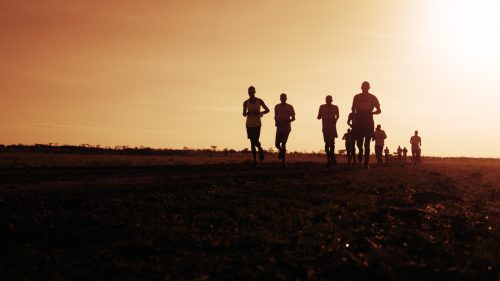
The Maasai Mara is certainly a place for a bucket list safari: big open plains filled with unbelievable wildlife; a gorgeous landscape home to an incredible culture and people. This also makes it a fantastic location for an adventurous feat of athleticism. The brainchild of Howard Stearns and executed by Sam Taylor, the UltraMARAthon was created to bring the Mara Conservancies, along with conservation and tourism partners surrounding the Mara, together to raise money for the rangers of the northern Mara through the organisation ForRangers. Though it has been a tough year for tourism with the pandemic, and maybe even a tougher year for conservation as a result, every dollar raised goes a long way in paying salaries and keeping the Mara protected.
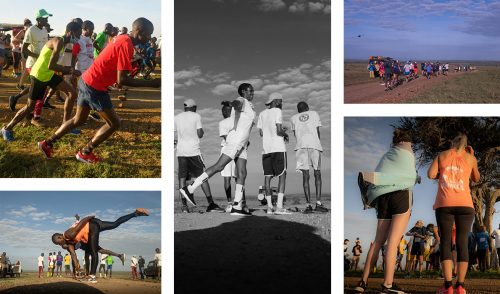
The 50km race, run individually or in relay teams of four, started in Naboisho conservancy at the crack of dawn; the colour of the sky slowly changed from black to dark blue to a pale yellow as the sun crested over the horizon. Sleepy racers appeared in cars from every direction, braving the crisp early morning. Sneakers laced and race bibs on, runners started to jog and warm up. The feeling in the air was a mix of excitement, nerves, and if I’m being honest, a small amount of dread for getting roped into running. Not a runner by nature in the slightest, I stood at the starting line looking around at the gazelle-like Kenyans with long sleek legs and thought, “I’ll just be happy to finish.” However, the pressure was on for my team to do well.
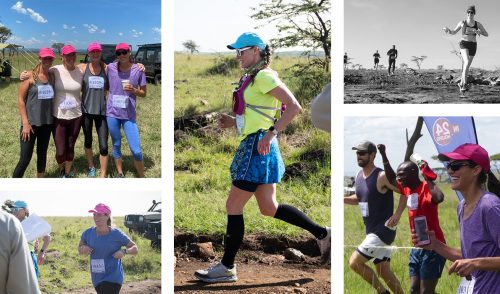
I was part of an all-women’s team, Running Wild, a group of Moms from the Mara community. We bonded during the COVID lockdown and running became our therapy and an opportunity to see one another safely in wide open spaces. But what started as a leisurely social activity grew more competitive once the UltraMARAthon was announced. My comfort level of running 5kms was quickly stretched as our weekly runs grew into longer distances with all of us pushing each other (a special thanks to Run Keeper for accountability). Come race time, we wanted to prove – mostly to ourselves – that our training was not for nothing.
28 relay team runners and 21 solo runners lined up at the start with checkpoints and water stations set along with medical personnel on standby. Rangers were posted nearly every 500m to keep the area safe from wildlife and overhead the helicopter from Mara Elephant Project was guarding from the skies. As you would expect, as soon as the race commenced the Kenyan runners and ranger teams shot out to the lead with the Angama Running Club in the mix, and a little further back, were a few ladies in hot pink hats from the Running Wild team.
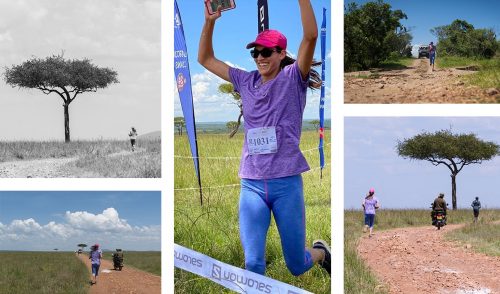
As part of a relay team, we were taken to our respective posts at each relay transition point 12.5km apart. Being the anchor of our team, I had mostly radio silence regarding how our team was doing with the exception of a dash of info once each leg was completed. When the third leg kicked off, we were in the lead for the all-women’s relay team. But as the runners started to come through following a brutal uphill leg, another runner from a different all-female team handed over the beaded rungu keychain to her teammate – and there went our lead. I waited anxiously to see a splash of pink on the horizon. My goal was just to run my race but now, finally with rungu in hand, I didn’t want to let my teammates down. I set my pace in the mid-day heat and was determined to finish strong, keeping a positive mindset. By the mid-way checkpoint, I saw my competitor; my stride lengthened and steadily I caught up, then passed. With only a few kilometers left to strengthen my lead, I was renewed with energy. As the finish line came into sight I saw my teammates (and ever-supportive husband) ready to run in with me and cheer me on. We did it! First place in the all-women’s relay. Through the wildlife, the altitude, and the grueling heat – we had won.
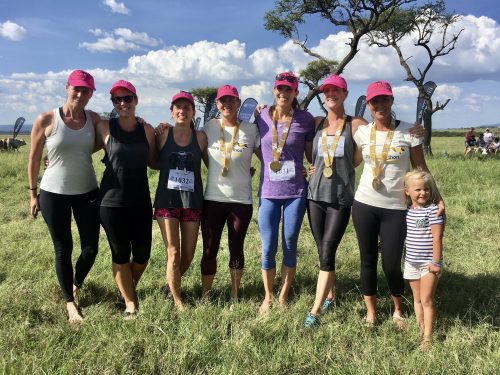
Being the inaugural race, it was kept relatively small with plans to grow each year, eventually drawing international runners and sponsors to raise significant funds for conservation. However, in its first year, the UltraMARAthon managed to raise over $25,000 USD, certainly something to be proud of. And I, along with my fellow Mara Moms, felt a different sense of pride – banding together, accomplishing our goals, and helping protect this beautiful reserve we call home.
Filed under: The Mara
Subscribe for Weekly Stories
Comments (2):
19 February 2021
Shannon, WOW! Congratulations. You will be missed next year or ... will you return?
16 February 2021
Way to go, Shannon and the rest of the Running Wild ladies! Congrats!
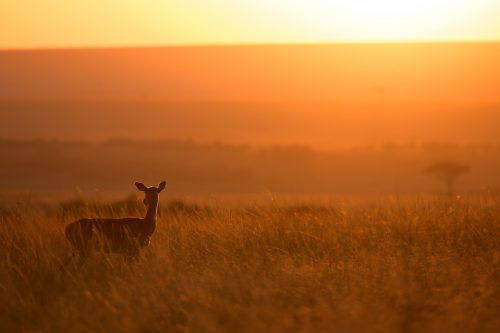
Rates & Availability